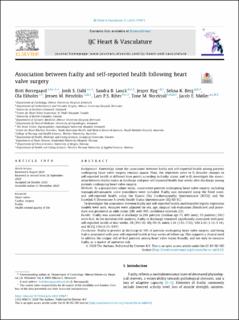| dc.contributor.author | Borregaard, Britt | |
| dc.contributor.author | Dahl, Jordi S. | |
| dc.contributor.author | Lauck, Sandra B. | |
| dc.contributor.author | Ryg, Jesper | |
| dc.contributor.author | Berg, Selina K | |
| dc.contributor.author | Ekholm, Ola | |
| dc.contributor.author | Hendriks, Jeroen M. | |
| dc.contributor.author | Riber, Lars P. S. | |
| dc.contributor.author | Norekvål, Tone M. | |
| dc.contributor.author | Møller, Jacob E. | |
| dc.date.accessioned | 2021-08-03T12:39:13Z | |
| dc.date.available | 2021-08-03T12:39:13Z | |
| dc.date.created | 2021-01-08T12:51:44Z | |
| dc.date.issued | 2020 | |
| dc.identifier.issn | 2352-9067 | |
| dc.identifier.uri | https://hdl.handle.net/11250/2766044 | |
| dc.description.abstract | Background
Knowledge about the association between frailty and self-reported health among patients undergoing heart valve surgery remains sparse. Thus, the objectives were to I) describe changes in self-reported health at different time points according to frailty status, and to II) investigate the association between frailty status at discharge and poor self-reported health four weeks after discharge among patients undergoing heart valve surgery.
Methods
In a prospective cohort study, consecutive patients undergoing heart valve surgery, including transapical/transaortic valve procedures were included. Frailty was measured using the Fried score, and self-reported health using the Kansas City Cardiomyopathy Questionnaire (KCCQ) and the EuroQoL-5 Dimensions 5-Levels Health Status Questionnaire (EQ-5D-5L).
To investigate the association between frailty and self-reported health, multivariable logistic regression models were used. Analyses were adjusted for sex, age, surgical risk evaluation (EuroScore) and procedure and presented as odds ratios (OR) with 95% confidence intervals (CI).
Results
Frailty was assessed at discharge in 288 patients (median age 71, 69% men); 51 patients (18%) were frail. In the multivariable analyses, frailty at discharge remained significantly associated with poor self-reported health at four weeks, OR (95% CI): EQ-5D-5L Index 3.38 (1.51–7.52), VAS 2.41 (1.13–5.14), and KCCQ 2.84 (1.35–5.97).
Conclusion
Frailty is present at discharge in 18% of patients undergoing heart valve surgery, and being frail is associated with poor self-reported health at four weeks of follow-up. This supports a clinical need to address the unique risk of frail patients among heart valve teams broadly, and not only to measure frailty as a marker of operative risk. | en_US |
| dc.language.iso | eng | en_US |
| dc.publisher | Elsevier | en_US |
| dc.rights | Attribution-NonCommercial-NoDerivatives 4.0 Internasjonal | * |
| dc.rights.uri | http://creativecommons.org/licenses/by-nc-nd/4.0/deed.no | * |
| dc.title | Association between frailty and self-reported health following heart valve surgery | en_US |
| dc.type | Journal article | en_US |
| dc.type | Peer reviewed | en_US |
| dc.description.version | publishedVersion | en_US |
| dc.rights.holder | Copyright 2020 The Authors | en_US |
| dc.source.articlenumber | 100671 | en_US |
| cristin.ispublished | true | |
| cristin.fulltext | original | |
| cristin.qualitycode | 1 | |
| dc.identifier.doi | 10.1016/j.ijcha.2020.100671 | |
| dc.identifier.cristin | 1867739 | |
| dc.source.journal | International journal of cardiology: Heart and Vasculature (IJCHA) | en_US |
| dc.identifier.citation | International journal of cardiology: Heart and Vasculature (IJCHA). 2020, 31:100671. | en_US |
| dc.source.volume | 31 | en_US |

